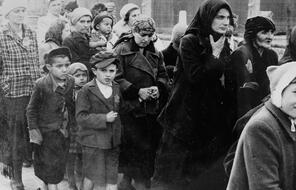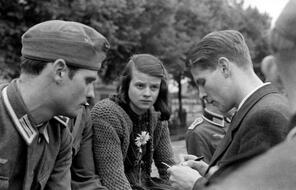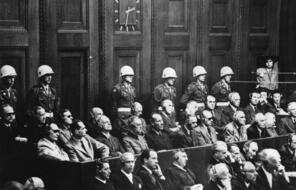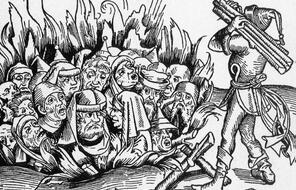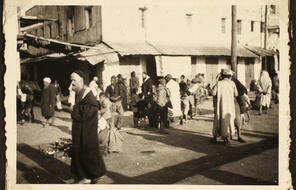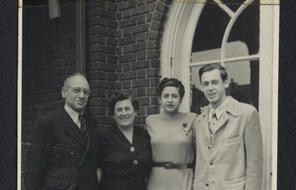Moral Luck and Dilemmas of Judgment
At a Glance
Subject
- History
- Social Studies
- Human & Civil Rights
- The Holocaust
Guido Calabresi’s description of four people who made surprising decisions during World War II (see reading, Choices that Define Us) reveals how it can be difficult to judge the complex and often unexpected choices that people make. Historians and philosophers, too, have thought about the challenges of making moral judgments about the actions of others, especially the actions of people in the past.
A 2013 BBC Magazine article asks, “Should we judge people of past eras for moral failings?” It continues:
Assessing attitudes and behaviour in the past presents us with a puzzle. What we might regard as offensive today—sexist, or racist, or homophobic for example—might have once been orthodoxy [accepted as normal].
A moral relativist would say that our values today can't be compared with the values from another era. What was right for them was right for them. What is right for us is right for us.
The philosopher Miranda Fricker is not a moral relativist, but she thinks the test for blameworthiness is whether the person could have known any different. “The proper standards by which to judge people are the best standards that were available to them at the time.”
It's unfair to blame people for failing to be moral pioneers, she says. “The attitude of blame presupposes that the person was in a position to have done better.”
But if we can't blame people for abhorrent views, does that also mean we can't hold them responsible for these views? 1
Fricker is suggesting that people’s ideas about right and wrong are largely shaped by their environments. Can individuals be held responsible for beliefs and actions that are determined more by those individuals’ circumstances than by their own free choice? Exploring this question, philosophers have written about a concept called “moral luck.” Philosopher Peter Levine explains moral luck in this way:
It [is] very unlikely that I would become a Nazi, since I was born to a Jewish father in the United States decades after World War II. But if I had been born a gentile [non-Jewish] German in 1910, I probably would have been a Nazi supporter by 1939, because most were. If I had been born a slave in Virginia in 1850, I would have been passionately opposed to slavery, but if I had been born to a white slaveholder at that time, I would have supported slavery because my group and culture did. So it is morally lucky that I am now opposed to slavery and Nazism, but I may be morally unlucky to have all kinds of blinders that I do not recognize. 2
But the idea of “moral luck” does not necessarily diminish the responsibility of people who did bad things in the past. For some philosophers, the test is whether or not there were people in the past who knew better. In other words, the existence of abolitionists (people who opposed slavery) in the United States in the 1850s and resisters to Nazism in the 1930s and 1940s shows that it was possible for individuals to recognize the immorality or outright evil of slavery and National Socialism. Others go further, saying that there are universal standards of right and wrong to which all people should be held regardless of their circumstances. Legal scholar Martha Minow writes: “By any measure of human decency, the Nazis’ efforts to exterminate the Jewish people of Europe, ethnic minorities, homosexuals, persons with disabilities, gypsies, and political opponents obviously violated any notion of duty, reasonableness, or fairness.” 3 According to these views, people like slaveholders and Nazi perpetrators are therefore indeed responsible for their beliefs and actions, even if they were in the majority. They could have, and should have, known better.
The BBC article on judging the past goes on to consider how people living today may be judged for our moral choices by those who come after us:
It may well be that the young or middle aged people of today will, in future decades, look back at views they once held and feel horrified and ashamed. And just as we judge [an earlier century], and identify its moral defects, so it is inevitable that the people of the 23rd Century will detect flaws in ours, the 21st. . . .
What else might our descendants condemn us for? If enough of us know the answer to that today, we really have no excuse but to act on it today. 4
Connection Questions
- What standards do you think we should use in judging the behavior of people of past eras? When is it fair to do so? When is it unfair?
- What is “moral luck”? Calabresi, Fricker, and Levine all suggest that given certain circumstances, all humans have the capacity to make poor choices. How might that concept change the way you think about the choices you make?
- Fricker and Levine both say that people's ideas about right and wrong are shaped by their environments. Do you agree? Who or what has influenced your beliefs about right and wrong? Have your beliefs about right and wrong ever changed?
- 1“Should we judge people of past eras for moral failings?,” BBC Magazine, August 20, 2013, accessed June 24, 2016.
- 2Peter Levine, email message to Facing History and Ourselves, January 10, 2016.
- 3Martha Minow, Between Vengeance and Forgiveness: Facing History after Genocide and Mass Violence (Boston: Beacon Press, 1998), 32.
- 4“Should we judge people of past eras for moral failings?,” BBC Magazine, August 20, 2013, accessed June 24, 2016.
How to Cite This Reading
Facing History & Ourselves, "Moral Luck and Dilemmas of Judgment," last updated August 2, 2016.


